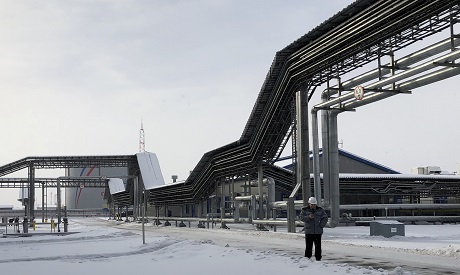
An oil storage tank of Russian oil pipeline monopoly Transneft is pictured at the Baltic Sea port of Ust-Luga, Russia February 26, 2018. REUTERS
Oil prices fell more than 3% on Monday, extending last week’s losses as coronavirus cases continued to surge in the United States and Europe, while Libya’s rebound in crude production raised fears of oversupply.
The United States reported its highest number yet of new coronavirus infections in two days through Saturday, while in France new cases hit a record of more than 50,000 on Sunday. Italy and Spain imposed fresh restrictions to curb the virus.
“It’s a dark Monday in the oil market,” said Bjornar Tonhaugen, head of oil markets at Rystad Energy. “We have long warned that a ‘second wave’ of strict coronavirus restriction measures could be re-imposed, and it’s now happening for real.”
Brent LCOc1 dropped $1.31, or 3.1%, to $40.46 a barrel by 11:06 a.m. EDT (1506 GMT). U.S. West Texas Intermediate (WTI) fell $1.36, or 3.4%, to $38.49 a barrel. Both contracts fell almost 2.5% last week.
Libya’s National Oil Corp (NOC) on Monday ended force majeure on the remaining facilities closed by an eight-month blockade of oil exports by eastern forces.
NOC said on Friday that Libyan production would reach 1 million barrels per day (bpd) in coming weeks, a quicker ramp-up than many analysts had predicted. That could complicate efforts by the Organization of the Petroleum Exporting Countries to restrict supply to cope with lackluster demand.
“The last thing the market needs right now is additional supply,” said Warren Patterson, ING’s head of commodities strategy.
OPEC’s secretary general said an oil market recovery may take longer than hoped as coronavirus inflections rise around the world.
OPEC+, the producer group and it allies including Russia, is set to increase output by 2 million bpd in January 2021 after a record production cut earlier this year.
“OPEC+ must not be careless and have to address the issue of the extra barrels appearing in the market, otherwise the days of relatively stable oil prices will be numbered,” said oil broker PVM’s Tamas Varga.
Short link: